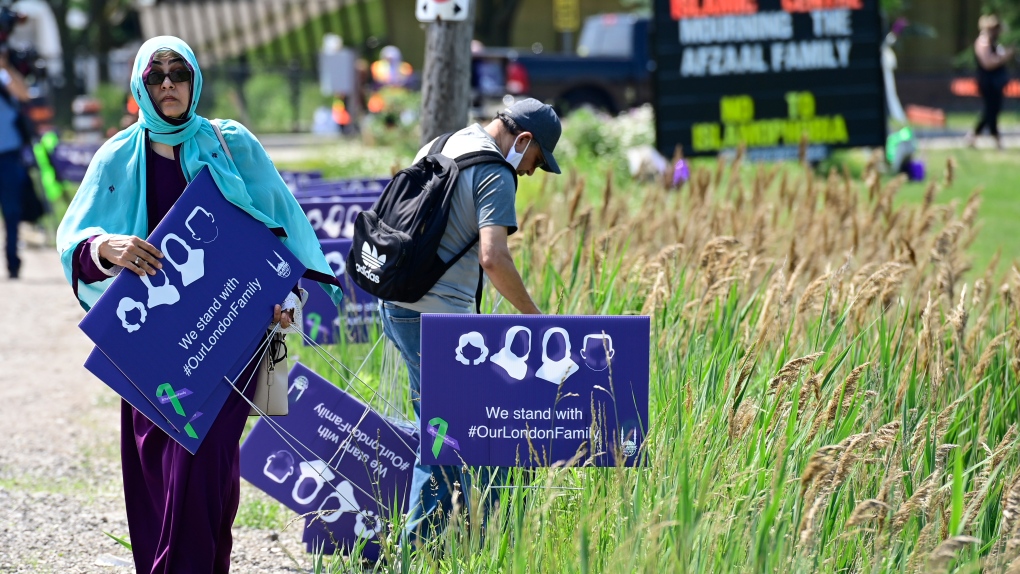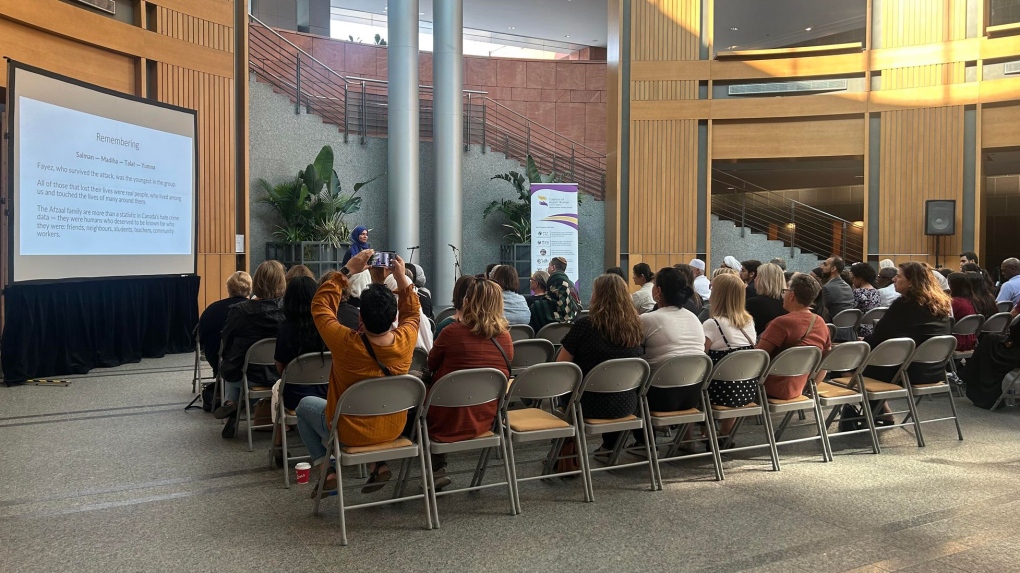Coalition of Muslim Women of KW hosts vigil on two year anniversary of the killing of the Afzaal family in London, Ont.
The Coalition of Muslim Women (CMW) of KW held a vigil on Tuesday evening to commemorate the lives lost on June 6, 2021 when four out of the five members of the Afzaal family were struck and killed by a man in a truck in London, Ont.
The Afzaal family was killed while they were out for a walk – in an apparently deliberate attack.
The victims were Muslim. Salman Afzaal, his wife Madiha, their 15-year-old daughter Yumna and 74-year-old grandmother Talat were killed. The family’s nine-year-old son survived.
One day later, on June 7, Nathaniel Veltman was charged with four counts of first-degree murder and one count of attempted murder. His trial is expected to start on September 5 in Windsor.
Members of the Muslim Wellness Network in London said there is still a lot of hurt among community members.
 A woman holds a sign at a funeral for the four Muslim family members killed in a deadly vehicle attack, in London, Ont., on Saturday, June 12, 2021. Talat Afzaal, 74, her son Salman Afzaal, 46, his wife Madiha Salman, 44, and their 15-year-old daughter Yumna Salman all died last Sunday night while out for a walk after a man in a truck drove them down in what police have called a premeditated attack because they were Muslim. THE CANADIAN PRESS/Frank Gunn
A woman holds a sign at a funeral for the four Muslim family members killed in a deadly vehicle attack, in London, Ont., on Saturday, June 12, 2021. Talat Afzaal, 74, her son Salman Afzaal, 46, his wife Madiha Salman, 44, and their 15-year-old daughter Yumna Salman all died last Sunday night while out for a walk after a man in a truck drove them down in what police have called a premeditated attack because they were Muslim. THE CANADIAN PRESS/Frank Gunn
KITCHENER VIGIL
The CMW of KW hosted a local vigil on Tuesday from 5:30 p.m. to 7:30 p.m., at the rotunda at Kitchener City Hall.
“We know that the community really felt the pain and shared the pain that we were also experiencing,” said Sarah Shafiq, director of advocacy, research and youth programming at CMW of KW, before the event. “This commemoration, this vigil is meant to bring the community together, share that grief sorrow and then come together to renew the solidarity and commitment to eradicate hate that we have.”
About 100 people attended the event that started with an interfaith prayer session. During the vigil there were also a number of faith leaders expressing their condolences for the Afzaal family.
There were also speakers who talked about how hate motivated incidents and discrimination can hurt the waterloo region community, with discussion on how it should be reported.
One attendee at the vigil said a local vigil is needed to learn how to grow from the pain felt in this community and in London, Ont.
“When we remember we learn from history. The best way to understand where we are, is to try to examine where we come from,” said Florence Juma. “We examine the past and make sense of the present. Then we purpose our ideal future. So gathering, the idea is let us not forget, not necessarily, because we want to think of the sadness and the evil, we want to tell ourselves what can do for a better future.”
The CMW of KW released their hate reporting website during the vigil.
The CMW also released its second annual Snapshot of Hate in Waterloo Region report, based on the data collected by their Anti-Hate Services.
 Sarah Shafiq, director of advocacy, research and youth programming at the CMW of KW speaks at a vigil at Kitchener City Hall. (CTV News/Heather Senoran)
Sarah Shafiq, director of advocacy, research and youth programming at the CMW of KW speaks at a vigil at Kitchener City Hall. (CTV News/Heather Senoran)
SNAPSHOT OF HATE IN WATERLOO REGION
On Tuesday, the CMW of KW released its second annual Snapshot of Hate in Waterloo Region report.
The report found that over the course of 2022, a total of 97 unique incidents were reported through the Hate or Discrimination Documentation and Reporting Service, operated by CMW.
Out of those incidents, 34 informants chose to report anonymously, whereas 63 chose to report in ways that connected them to staff at CMW.
Just under half of the informants disclosed their age. Of those who disclosed, most were between the ages of 23 and 34.
Reported incidents of hate and discrimination were more likely to happen in Waterloo region’s urban centres, with Kitchener accounting for a majority of the incidents, according to the report.
When it comes to the spaces where reported incidents were experienced, institutions represented the largest category at 22 per cent of all the reports. Among the institutions identified, schools (elementary, secondary and post-secondary) reflected the largest number of reports.
The types of hate experienced were classified under the five categories: hate crimes, hate incidents, discrimination and hate speech. Hate incidents – described by CMW as non-criminal harmful actions against an identifiable minority group, is how 29 per cent of the cases were classified. Twenty-eight per cent were classified as discrimination. Hate speech represented 24 per cent of the cases and 9 per cent were hate crimes, according to the report.
Informants were asked to identify their perceived reason for the hate or discrimination. The most common perceived reason was Islamophobia (44 per cent). Other perceived reasons were xenophobia, anti-Asian racism, and anti-Black racism.
HOW DATA WAS COLLECTED
The information in the report was collected through the Hate or Discrimination Documentation and Reporting Service, operated by CMW.
“This service received reports of hate or discrimination from multiple sources, through the report hate website, in person, through CMW staff, over the phone, through the use of WhatsApp, and through email,” the report said. The CMW said they also received data from Statistics Canada, the Waterloo Regional Police Service (WRPS), and community partners who submitted their observations from 2022.
SUPPORT SERVICES AVAILABLE
The CMW said there are is a variety of services to support people affected by incidents of hate or discrimination. The services they listed in the report range from individual supports to formal reporting and systems navigation, to systems level advocacy. The CMW listed a number of different services provided including mental health supports/counselling, assistance in formal reporting/filing, system navigation, and legal support.
“CMW’s intentional planning around individuality and flexibility in their support services is a critically important approach to being able to meet informants where they are at with a continuum of services that work for resolving issues, but also work to prevent issues from escalating or prevent more incidents from happening in the future,” the report reads.
With reporting from CTV News London.
CTVNews.ca Top Stories

BREAKING Israel attacks Iran, Reuters sources say; drones reported over Isfahan
Israel has attacked Iran, three people familiar with the matter told Reuters, as Iranian state media reported early on Friday that its forces had destroyed drones, days after Iran launched a retaliatory drone strike on Israel.
American millionaire Jonathan Lehrer denied bail after being charged with killing Canadian couple
American millionaire Jonathan Lehrer, one of two men charged in the killings of a Canadian couple in Dominica, has been denied bail.
Nearly half of China's major cities are sinking, researchers say
Nearly half of China's major cities are suffering 'moderate to severe' levels of subsidence, putting millions at risk of flooding especially as sea levels rise.
Prince Harry formally confirms he is now a U.S. resident
Prince Harry, the son of King Charles III and fifth in line to the British throne, has formally confirmed he is now a U.S. resident.
Judge says 'no evidence fully supports' murder case against Umar Zameer as jury starts deliberations
The judge presiding over the trial of a man accused of fatally running over a Toronto police officer is telling jurors the possible verdicts they may reach based on the evidence in the case.
Health Canada to change sperm donor screening rules for men who have sex with men
Health Canada will change its longstanding policy restricting gay and bisexual men from donating to sperm banks in Canada, CTV News has learned. The federal health agency has adopted a revised directive removing the ban on gay, bisexual and other men who have sex with men, effective May 8.
Colin Jost names one celebrity who is great at hosting 'Saturday Night Live'
Colin Jost, who co-anchors Saturday Night Live's 'Weekend Update,' revealed who he thinks is one of the best hosts on the show.
Sports columnist apologizes for 'oafish' comments directed at Caitlin Clark. The controversy isn't over
A male columnist has apologized for a cringeworthy moment during former University of Iowa superstar and college basketball's highest scorer Caitlin Clark's first news conference as an Indiana Fever player.
'Shopaholic' author Sophie Kinsella reveals brain cancer diagnosis
Sophie Kinsella, the best-selling author behind the 'Shopaholic' book series, has revealed that she is receiving treatment for brain cancer.
































